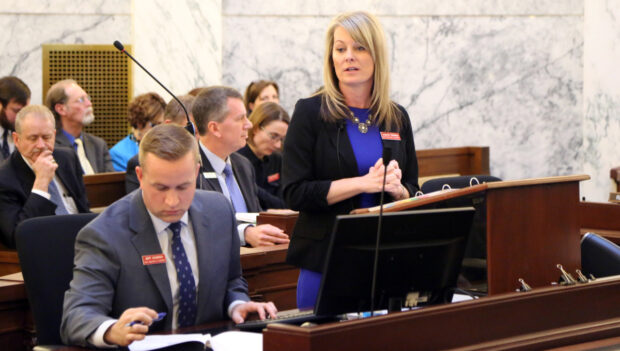With the legislative session winding to a close, House Education Committee Chairwoman Julie VanOrden is launching a last-minute effort to do away with a statewide reading test.
VanOrden, R-Pingree, is pushing a bill to allow local school districts to choose and administer their own reading assessment tests to kindergarten through third-grade students.
If the bill passes, the changes would not take effect until July 1, 2019 — just before the start of the 2019-20 school year.
Currently, Idaho law calls for using a single, statewide test to identify reading deficiencies in K-3 students. The state uses the Idaho Reading Indicator, but Superintendent of Public Instruction Sherri Ybarra has launched a pilot program to transition to a new test.
Last month, the Joint Finance-Appropriations Committee cut a funding request to replace the IRI — putting the brakes on Ybarra’s plan to adopt a new test in 2018-19.
VanOrden’s bill would seize on the gridlock by instead allowing school districts to pick their own test. VanOrden said districts could choose to stick with the existing IRI, adopt the pilot, or select a completely new and different test.
“Before you today is a proposal that would let local districts assess their students as they see fit,” VanOrden said. “(This bill) puts it back in the hands of the teachers and the administrators out in the field in making those choices.”
The choice of assessment — and the larger issue of providing extra assistance to Idaho’s struggling young readers — appears to be one of the last unresolved issues of the year. Legislative leadership is working to wrap up the year’s business as early as next week.
House Speaker Scott Bedke, R-Oakley, told the legislative press corps on Tuesday the reading test issue “was unresolved at this point” and “an important component to the governor.”
House Education voted to introduce the bill, clearing the way for it to return to the committee for a hearing.
Potential revival of science standards debate
Just when the debate appeared to be settled, House Education revived the science standards controversy.
Under VanOrden’s lead, the committee introduced a House Concurrent Resolution asking the Legislature to agree with House Education’s action to reject one science standard and about a dozen pages of supporting content.
Earlier this year, House Education removed one science standard referencing fossil fuels and all supporting content. After that, the Senate Education Committee nullified the House’s action by approving the science standards in full.
Normally, it takes both legislative chambers acting in unison to reject academic standards contained in administrative rule — and the Senate did not follow the House’s lead. But State Administrative Rules Coordinator Dennis Stevenson told House Education that if the concurrent resolution passes the House and Senate, the science standard and supporting content would be repealed after all.
VanOrden insisted that the move was procedural, and designed to officially record the House’s vote. She also called it a formality, and speculated the Senate would not likely consider the resolution, let alone pass it.
But Rep. John McCrostie, D-Garden City, cried foul. He said passage of the new resolution amounts to a backdoor way of subverting Senate Education’s action.
“Ultimately, this could be an end-around and this concerns me,” McCrostie said.
Rep. Lance Clow, R-Twin Falls, supported House Education’s original decision to remove one science standard and all supporting content, but he was still confused by Wednesday’s resolution.
“I don’t understand why we’re doing it,” Clow said.
In the end, the resolution passed comfortably on a voice vote, with the committee’s three Democrats casting the only opposing votes. The resolution is likely to head back to House Education for a full hearing, and then head to the House floor.
ESSA update
Ybarra briefed House Education on the state’s plan to comply with the federal Every Student Succeeds Act — but she may have taken a few liberties in describing the process.
ESSA is designed to replace the controversial No Child Left Behind Act, and empower states and school districts — not the feds — to take the lead on education policy and school accountability.

For much of 2016 and 2017, Ybarra and her State Department of Education team worked to develop the state’s plan to comply with ESSA.
Ybarra gave the committee a glowing report Wednesday, but her account differs from the experience of some.
“We have engaged our stakeholders every step of the way,” Ybarra told the committee Wednesday.
Ybarra did not tell the committee that the leaders of two prominent education stakeholder groups wrote a letter to Gov. Butch Otter in June saying they were ignored as Ybarra developed the plan. The groups had first said they were ignored seven months earlier.
In the June letter, the Idaho School Boards Association and Idaho Education Association said they were “discouraged,” “dismayed” and “feel disrespected.” ISBA Executive Director Karen Echeverria warned Otter that the ESSA plan “will be a disaster” without buy-in from a wide array of education groups and constituents.
About two weeks after the letter was sent to Otter, Senate Education Chairman Dean Mortimer said he was also in the dark.
“Since we did not have any conversation about this ESSA plan during the (2017) legislative session, the further we got into summer, and the more we heard about it and learned about it, as chairmen of the House and Senate education committees, we realized we really weren’t up to date,” Mortimer told Idaho Education News in June.
The IEA/ISBA letter to Otter prompted State Board of Education member Debbie Critchfield and some SDE staffers to launch a series of near-emergency meetings with education groups to go through the ESSA plan line by line.
Idaho submitted the ESSA plan to the feds in September. The feds requested additional information on Dec. 28, initially calling for a Jan. 12 deadline.
Idaho sought a deadline extension and re-submitted a revised plan Feb 15.
Idaho is still waiting for the feds to approve the ESSA plan.
